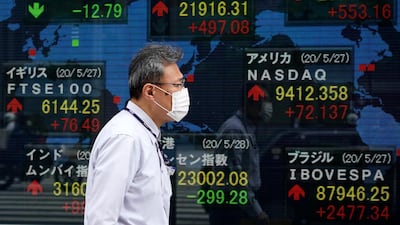Receiving the results of a coronavirus test can take anywhere between a few minutes and several days, depending on the method and the capacity of those doing the testing. Diagnosing the damage the virus has wrought on the global economy, however, is a much more time-consuming affair.
Since the damage began to unfold with a string of border closures and lockdowns earlier this year, the Organisation for Economic Co-operation and Development, a grouping of developed economies, has been gathering the data for its own assessment. The diagnosis is in and the results are not good.
“This is the most uncertain and dramatic outlook since the creation of the OECD,” said Laurence Boone, its chief economist, on Tuesday.

Even if the force of the pandemic continues to ease, the global economy is expected to contract by six per cent this year. Should a second wave of infections lead to fresh lockdowns, the contraction could be as much as 7.6 per cent.
In economics, as in medicine, it is sometimes good to get a second opinion. The World Bank and the International Monetary Fund have released their own forecasts, predicting contractions of 5.2 per cent and three per cent, respectively, though both organisations have warned that uncertainty remains.
Beneath these global outlooks, however, lie diverse national narratives. Not all countries have managed to curb their coronavirus infection rates equally, and this will be reflected in their economic prospects.
The UK, which in all likelihood has suffered the highest number of confirmed coronavirus infections and deaths in Europe, is expected to see 2020 economic output decline by 11.5 per cent, according to the OECD. South Korea, which has become a renowned example for pandemic response, will experience a contraction of just 1.2 per cent.
The relationship between pandemic response and economic prospects paints a relatively hopeful picture for the UAE, which has achieved one of the highest levels of testing and lowest numbers of coronavirus deaths per capita of any wealthy country.
No country will avoid a contraction this year, and many people in the UAE have been affected by the pandemic. In a recent interview with The National, Ali Matar, the head of the EMEA region for LinkedIn, an employment-oriented social networking platform, noted that hiring in the UAE fell by 60 per cent at the end of April.
But there is widespread agreement in global policy circles and financial markets that the Emirates will see the pandemic through with uncommon economic resilience.
On Wednesday, Moody's, a global credit ratings agency, affirmed a stable outlook for the UAE, with a credit rating of Aa2 – among the top tier. The distinction is all the more significant in light of the prolonged downturn in oil prices, given the prominence of hydrocarbons in the Emirati economy.
Nonetheless, the significance of the country’s remaining reserves, its continued implementation of a vision for diversification and the wide array of jobs under development in future-oriented sectors all point to a stable outlook. It is little wonder that Mr Matar notes that UAE job postings in software and IT services – particularly cybersecurity – along with health care and remote-services work, continue to rise.
It remains to be seen to what extent OECD figures bear out, and whether a second wave of infections will dampen economic prospects by the end of the year. And while there is no vaccine to the impending downturn, economies have a built-in resilience. The damage could be severe, but with a degree of adaptation, recovery is certain.


